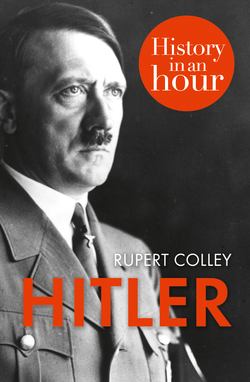Читать книгу Hitler: History in an Hour - Rupert Colley - Страница 9
На сайте Литреса книга снята с продажи.
ОглавлениеHitler the Soldier
Six months later, on 1 August 1914, Germany declared war on Russia. The news was received enthusiastically throughout the country and Hitler, especially, was ecstatic.
A photograph taken on 2 August outside the Feldherrenhalle (the Field Marshals’ Hall) in Munich shows a large, unruly crowd of happy Germans cheering the news. Amongst them, his face rapt with joy, was the 25-year-old Adolf Hitler.
News of the outbreak of war is received enthusiastically in Munich, August 1914. Among the crowd is Hitler
Hitler tried to enlist immediately, but as an Austrian was rejected. A letter to King Ludwig swearing his devotion to the German cause did the trick though, and Hitler was allowed to join the 16th Bavarian Reserve Regiment, known as the List Regiment after its commander, Colonel List.
Hitler as a soldier, c.1914
The List Regiment fought and suffered terribly on the Western Front during the First Battle of Ypres. Hitler (pictured above, seated far right) was awarded the Iron Cross (Second Class) and promoted to the rank of lance corporal for saving a wounded officer stranded in noman’s-land. ‘It was,’ he wrote to his Munich landlord, ‘the happiest day of my life.’ Hitler’s task, as a dispatch runner, was to carry messages to and from the headquarters behind the front to the officers in the field, often under artillery fire. Having been promoted to corporal so early on in the war, the expectation would have been promotion to sergeant but his superiors denied him, believing Hitler would never command the respect of his men.
Hitler was not a typical soldier. He did not drink, smoke or seek the company of the local prostitutes, and actively voiced his disgust of these common pursuits. Although respected by his comrades, he seemed uninterested in forming friendships and preferred his own company, reading, sketching, painting watercolours, writing poetry and contemplating. (Hitler’s skill as an artist, although far from the genius he sometimes believed he was, was credible, but his poetry left much to be desired.) He received no parcels, nor letters, and when he did talk it was invariably to lecture on one of his pet subjects. His only companion was a white terrier dog he befriended and named Foxl. He was distraught when, on separate occasions, Foxl and his sketchbook were stolen. But the war gave Hitler’s life a purpose. The listless, daydreaming wanderer who had never done a day’s work had found his vocation.
In October 1916, the List Regiment joined the fray at the Battle of the Somme. Again, the regiment was decimated and Hitler, who had managed to survive unscathed for so long, had become almost a talisman for his comrades. But Hitler’s luck was about to run out and on 7 October a piece of shrapnel lodged in his left thigh – or, as later rumoured, his groin, and it was from this incident that the joke that Hitler lacked a testicle came. Despite his protestations that he was fit enough to carry on, Hitler was invalided back to Germany and to Berlin.
It was the future leader’s first visit to the capital. While impressed by the city and its architecture and history, Hitler became increasingly angered by the defeatist talk of its impoverished and hungry civilians. He said he saw Jews everywhere, equating them to spiders sucking the blood from people, and the streets were full of workers on strike, whom he despised as cowards and traitors.
Hitler as a soldier, c.1917, Picture from the Office for Emergency Management, Office of War Information
In March 1917, much to his delight, Hitler was declared fit and returned to the front. Warmly welcomed by his comrades, Hitler (pictured above on the far left) returned to his duties as messenger. He disliked the new recruits who, unlike his optimistic generation, arrived at the front full of pessimism. The regiment fought at Arras and Passchendaele and in August 1918 Hitler was awarded another Iron Cross, this time First Class, a rarity for a non-commissioned officer. The recommendation came from one Hugo Gutmann, an officer in the List Regiment and a Jew.
Two months later, on 13 October 1918, the regiment suffered a gas attack and Hitler and many of his comrades were partly or temporarily blinded. For the second time Hitler was invalided back to Germany, this time to Pomerania. It was during his recuperation that Germany, who not long before had been on the offensive, surrendered and signed the armistice ending the war.
Hitler, still recuperating and fearing for his sight, was devastated.
After stints as a border guard and a prisoner-of-war guard, Hitler returned to Munich in February 1919, totally unsure what the future held for him, and fearing a return to civilian life, determined to remain in the army.
